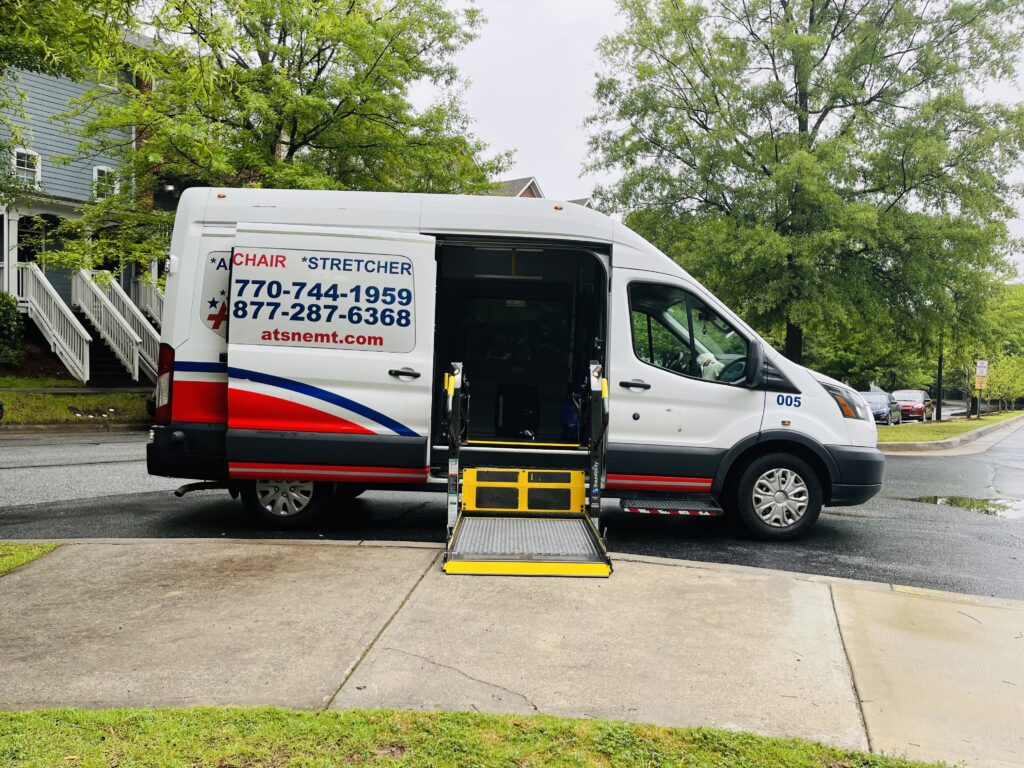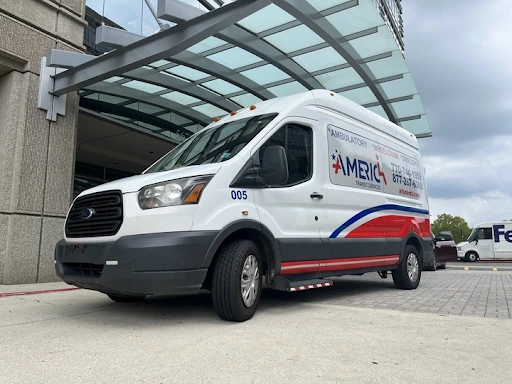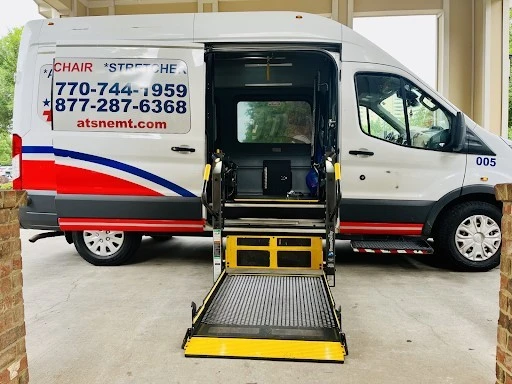Dependable Non-Emergency Medical Transportation (NEMT) Services

Navigating the healthcare landscape can be a challenging endeavor, especially for those with mobility issues or senior citizens. Adding transportation to medical appointments into the mix? It can almost feel like an impossible task. Imagine missing crucial treatments and therapies due to lack of dependable transportation – a frightening prospect indeed! Here at our blog, we’re shedding light on how reliable non-emergency medical transportation (NEMT) services are transforming healthcare accessibility for people across the globe, ensuring they never miss an appointment, therapy session, or routine check-up. Join us as we delve into this relatively unsung hero in healthcare management: the lifeline you perhaps never knew you needed.
Non-emergency medical transportation (NEMT) services provide transportation to and from medical appointments for individuals who require assistance getting there. These services can include basic transportation in a sedan or van, as well as specialized vehicles with wheelchair accessibility and other accommodations. NEMT services are often covered by Medicaid or private insurance, but can also be provided by private companies for a fee.
NEMT services may use various vehicles, including wheelchair-accessible vans, sedans, ambulettes, and other specially equipped vehicles based on the passengers’ mobility needs.
Types of Non-Emergency Medical Transportation Services
When it comes to non-emergency medical transportation (NEMT) services, there are various options available to cater to different needs and conditions. Let’s explore some of the common types of NEMT services that help ensure healthcare accessibility for individuals who require assistance in transportation:
Ambulance Services
Ambulance services play a crucial role in NEMT, especially for patients with complex medical conditions or mobility challenges. These specialized vehicles are equipped with life-saving equipment and staffed by trained medical professionals. While ambulances are often associated with emergency situations, they also provide non-emergency transportation for patients who require medical monitoring or specialized care during transit.
Imagine a scenario where an elderly patient needs transportation from their home to a medical appointment at a hospital. Due to their chronic health condition requiring constant oxygen support, a regular vehicle wouldn’t be suitable, and the presence of trained paramedics would provide assurance throughout the journey.
What sets ambulance services apart is their ability to handle critical medical situations during transportation. They may have advanced life support systems on board, including cardiac monitors, defibrillators, and ventilators. Ambulance services can be particularly beneficial when transporting patients who require continuous monitoring or immediate medical intervention if complications arise.
It’s important to note that ambulance services can be costly due to the level of specialized care provided and the equipment involved. Therefore, they are typically reserved for patients with medical conditions that necessitate such attention during transport.
While ambulance services are essential for certain cases, there is a range of other NEMT options available that cater to different levels of mobility assistance and specific transportation needs.

Mobility Assistance Services
Mobility assistance services encompass a range of support designed to aid individuals with limited mobility, including those with disabilities or age-related challenges. These services may involve the provision of mobility aids, such as wheelchairs or walkers, as well as assistance with transportation, accessibility modifications, and support with daily activities to enhance overall independence.
In the realm of Non-Emergency Medical Transportation (NEMT) services, one essential aspect is Mobility Assistance Services. These services are designed to cater to individuals who require additional aid in getting around due to physical limitations or disabilities. The aim is to ensure that all individuals, regardless of their mobility challenges, have access to the necessary healthcare resources they require.
Imagine a scenario where an elderly patient needs to visit a specialist for a follow-up appointment but faces difficulties using public transportation due to limited mobility. In such cases, NEMT providers offer specialized assistance to meet their unique needs. This may include providing wheelchairs, walkers, or other mobility aids during transit, ensuring that patients can move comfortably and safely from their doorsteps to healthcare facilities and back.
These mobility assistance services also extend beyond physical movement. Some individuals may require assistance with boarding and disembarking from vehicles, and NEMT providers can accommodate these needs as well. Additionally, drivers and attendants are trained to handle any medical equipment that patients may need to bring along.
Consider a situation where a patient requires oxygen therapy or carries life-saving medication with them. A reliable NEMT service will have staff trained in handling and ensuring safe travel for these patients while taking into account their specific medical requirements.
The goal of mobility assistance services is not only to transport individuals physically but also to provide support and care throughout their journey. These extra measures allow patients with mobility challenges to access healthcare services without undue stress or inconvenience.
Some might argue that these specialized mobility assistance services may be unnecessary or too costly. However, it is important to consider the long-term benefits they offer both patients and society as a whole. By providing reliable transportation options for those who struggle with mobility, we can ensure equitable access to healthcare for everyone.
Now that we understand the importance of mobility assistance services in NEMT, let’s explore the eligibility criteria for accessing these valuable transportation resources.
Eligibility for Non-Emergency Medical Transportation Services
To utilize Non-Emergency Medical Transportation (NEMT) services, it’s crucial to meet certain eligibility requirements. The specifics may vary depending on the state and the type of health insurance coverage individuals have. However, there are general guidelines that can help determine eligibility for NEMT services.
Typically, individuals eligible for Medicaid or another state-funded healthcare program are eligible for NEMT services. This includes individuals with mobility limitations or disabilities who require assistance in getting to and from medical appointments.
Let’s consider a scenario where a person with a chronic illness is covered by Medicaid. They may be considered eligible for NEMT services if their health condition significantly impairs their ability to use public transportation or private vehicles, rendering it difficult or unsafe to travel alone.
Apart from mobility limitations, other factors are taken into account when determining eligibility. These can include medical needs that necessitate specialized transportation such as wheelchair accessibility or life-support equipment during transit.
It’s important to note that NEMT services may have specific exclusions based on the nature of healthcare services required. While transportation to healthcare providers and covered services is generally within the purview of NEMT services, certain situations like transporting patients to pharmacies or providing rides for specific treatments may not be covered.
Think of the eligibility process for NEMT services as similar to applying for financial assistance. Just as applicants need to provide documentation and details about their financial status, individuals seeking NEMT assistance may need to share medical records and information about their mobility challenges.
Determining eligibility is typically done through an application process conducted by the state or managed care organization responsible for administering NEMT services. Thus, it is advisable to reach out to the appropriate entity or consult the local Medicaid office to understand and navigate the eligibility requirements specific to your area.
Having delved into mobility assistance services and eligibility criteria, let’s now explore the procedure for utilizing Non-Emergency Medical Transportation (NEMT) services.

Procedure for Utilizing Non-Emergency Medical Transportation Services
Getting access to reliable non-emergency medical transportation (NEMT) services is essential for individuals who require assistance in traveling to and from medical appointments. To ensure a smooth experience, there is a standard procedure that needs to be followed when utilizing NEMT services.
The first step is to determine whether you qualify for NEMT services. Generally, NEMT is available to individuals who have specific healthcare needs but are unable to use other forms of transportation due to medical, physical, or financial limitations. Qualification guidelines may vary depending on the state and the specific NEMT program being used.
Once you’ve determined your eligibility, the next step is to contact the NEMT provider or the coordinating entity responsible for arranging these services. This can be a local transportation agency or a designated broker that works with multiple providers. They will help assess your needs and schedule the appropriate transportation for you.
It’s important to provide accurate and detailed information about your medical condition, appointment details, and any special requirements you may have during transportation. This will help ensure that the NEMT provider can accommodate your needs effectively.
Following the initial contact, the NEMT service provider will work with you to coordinate the scheduling of your transportation. They will consider factors such as your location, appointment time, and any specific preferences or accommodations required.
For instance, if you need regular dialysis treatment and have recurring appointments every Monday at 10 am at a specific healthcare facility, the NEMT provider will schedule your transport accordingly. They may also assign a dedicated driver or vehicle based on your specific needs, such as accommodating mobility devices or providing extra assistance during transit.
It’s crucial to understand that NEMT services prioritize safety and reliability. Thus, it’s advisable to book your transportation well in advance to ensure availability and avoid any last-minute complications. Many NEMT providers have set cut-off times for booking, so it’s important to be aware of those guidelines and adhere to them.
Now that we’ve explored the procedure for utilizing NEMT services, let’s take a closer look at the process of booking a service.
Booking a Service
When it comes to booking an NEMT service, there are several steps involved to ensure a seamless experience. It starts with reaching out to the NEMT provider or coordinating entity responsible for arranging transportation.
During the booking process, you will need to provide specific details such as your name, address, contact information, and the healthcare facility you will be visiting. Additionally, you may need to share information about your medical condition or any special accommodations required during transit.
The NEMT provider will work with you to determine the most suitable date and time for your transportation based on your appointment schedule. They will also consider factors like pick-up location, drop-off location, and estimated travel time to ensure punctuality.
For example, if you have chemotherapy scheduled every Wednesday morning at a hospital that is 10 miles away from your home, the NEMT provider will arrange for a vehicle and driver to pick you up from your residence at an appropriate time that allows for a comfortable arrival before your appointment.
Once your booking is confirmed, it’s essential to make note of the date, time, and any other relevant details provided by the NEMT provider. This will help you prepare for the journey accordingly and avoid any confusion or miscommunication on the day of transport.
Now that we understand the procedure for utilizing non-emergency medical transportation services and how to book a service effectively, it’s crucial to explore further aspects related to service delivery.
Service Delivery
Service delivery is a crucial aspect of non-emergency medical transportation (NEMT) services. It involves the coordination and provision of transportation to individuals who require assistance in getting to and from medical appointments. The goal is to ensure that healthcare access is not hindered due to transportation barriers.
Non-emergency medical transportation services are designed to cater to individuals with various needs, such as those with disabilities, chronic illnesses, or limited mobility. Depending on the specific requirements of the individual, different types of transportation can be utilized. This may include ambulatory vehicles for individuals who are able to walk or use a wheelchair-accessible vehicle for those with mobility challenges.
The service delivery system of NEMT involves multiple stakeholders working together to ensure efficient and reliable transportation for patients. This includes healthcare providers, transportation companies, drivers, and insurance companies or benefits programs like Medicaid.
Some healthcare facilities may have their own fleet of vehicles and drivers to provide NEMT services directly to their patients, while others may outsource this responsibility to specialized NEMT providers. Both approaches have their advantages and disadvantages. Having an in-house fleet allows healthcare facilities to have more control over the quality and scheduling of transportation. On the other hand, outsourcing to NEMT providers can offer more flexibility, a wider range of vehicles, and expertise in navigating the intricacies of providing NEMT services.
For instance, a hospital might have its own transportation department that handles all aspects of NEMT within its network. This department would coordinate the scheduling of pickups and drop-offs based on patient appointments, ensuring that there is minimal delay or disruption. Alternatively, a smaller clinic might partner with a dedicated NEMT provider in the community, relying on their expertise and resources to facilitate transportation for their patients.
Whichever approach is taken, it is essential for these services to be reliable and punctual. Depending on the regulations and guidelines set by insurance companies or benefits programs, there may be specific criteria that transportation providers must meet. This could include driver qualifications, vehicle standards, and adherence to safety protocols.
To put it into perspective, think of NEMT as a vital link in the healthcare chain. Without reliable and efficient transportation, individuals might face difficulties in accessing medical care, leading to delayed treatments, missed appointments, and potential health consequences.
Now that we have explored the importance of service delivery in NEMT, let’s delve into another crucial aspect: preventing fraud in non-emergency medical transportation services.

Preventing Fraud in Non-Emergency Medical Transportation Services
Non-emergency medical transportation (NEMT) services are susceptible to fraud due to the financial reimbursement schemes associated with them. As a result, it becomes essential for providers to take proactive measures to prevent fraudulent activities.
| Common Fraud Schemes | Prevention Tips |
| Billing for services not provided | Regularly audit records and billing statements to identify any discrepancies or irregularities. Implement strong monitoring systems that ensure accurate record-keeping and billing processes. |
| Ghost trips (billing for trips that did not occur) | Utilize GPS tracking systems or other technological solutions to verify the completion of each trip. Conduct periodic checks to match records of scheduled trips with those actually completed. |
| Kickback schemes (receiving payments for patient referrals) | Establish clear policies against kickbacks and educate staff members about the consequences of engaging in such unethical practices. Encourage reporting of any suspicions or evidence related to kickback schemes. |
These are just a few examples of common fraud schemes in NEMT services and tips on how providers can prevent them. It is important for NEMT providers to remain vigilant and stay informed about evolving fraud tactics.
For instance, a NEMT provider can implement frequent audits and data analysis to detect any irregular patterns or suspicious activity. Additionally, using secure systems for record-keeping and billing processes can further enhance security and minimize the risk of fraudulent activities.
By actively taking preventive measures against fraud, NEMT providers ensure the integrity of their services and maintain the trust of their clients and stakeholders.

Reliable Non-Emergency Medical Transportation Services – Your Trusted Partner Americ Transit Services
At Americ Transit Services, we’re not just another non-emergency medical transportation service provider – we’re your trusted partner in healthcare mobility. We understand that every journey to a medical appointment or treatment center is a significant part of your healthcare experience, and we’re committed to making it as reliable, comfortable, and stress-free as possible.
Our team of professionals is dedicated to ensuring your safety, comfort, and peace of mind. From our highly trained drivers to our meticulously maintained fleet of vehicles, we leave no stone unturned in providing you with the highest quality service. At Americ Transit Services, we believe that your health and well-being should be your primary focus during medical journeys, and we’re here to support that mission. Experience the difference of reliable non-emergency medical transportation by choosing us as your trusted provider. Your comfort, convenience, and care are our top priorities, every time you travel with us. Contact us today to book your ride and explore our comprehensive services. Let us take care of your transportation needs, so you can focus on what truly matters – your health and well-being.
Recent Comments